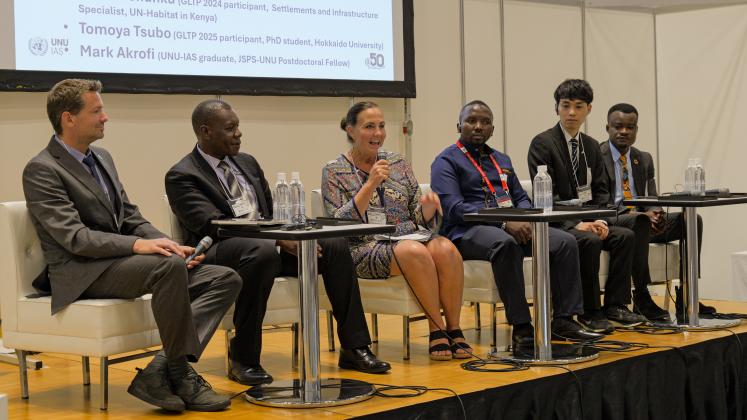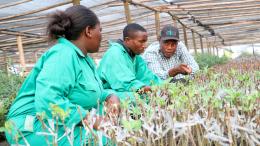On 21 August 2025, UNU-IAS organized a thematic event at the 9th Tokyo International Conference on African Development (TICAD 9) on the theme “Accelerating Sustainable Development in Africa: Perspectives from Future Leaders”. It featured alumni of the Global Leadership Training Programme for Sustainable Development in Africa (GLTP), a UNU-IAS capacity development course for postgraduate students.
Opening the session, Tshilidzi Marwala (Rector, UNU) emphasized the close partnership of UNU with the Government of Japan to advance Africa’s development, noting that GLTP has nurtured leaders who combine academic excellence with socially engaged research and community-driven solutions.
GLTP participants reflected on their learnings and experiences in the course, and how they had contributed to their current work. Eric Muchunku (Settlements and Infrastructure Specialist, UN-Habitat in Kenya) highlighted his socially inclusive approach to development projects — delivering projects with the community, instead of for the community. Discussing his work on infectious disease control in Africa, Tomoya Tsubo (PhD student, Hokkaido University) stressed the importance of international cooperation and knowledge sharing. Mark Akrofi (JSPS-UNU Postdoctoral Fellow) described GLTP as a laboratory of ideas, perspectives and collaborations extending beyond the classroom.
A panel discussion moderated by Nicholas Turner (Strategy and Knowledge Management Specialist, UNU-IAS) explored the unique features of GLTP, including interdisciplinary and community-based research approaches. Carol Anne Spreen (Associate Professor, New York University) underlined how this innovative pedagogy provides innovative learning experiences and develops much-needed leadership skills. She emphasized the enormous potential of GLTP alumni and suggested further mobilizing this network. Summarizing the session, Philip Osano (Chair, UNU-IAS Board; Chief Operating Officer, CIFOR-ICRAF) noted the evolution of GLTP over the years and how the programme had overcome the challenges of COVID-19 by harnessing the power of digitalization. He praised the participants’ leadership skills and contributions to developing solutions that are practical, equitable and grounded in local realities.
In a closing statement, Shinobu Yume Yamaguchi (Director, UNU-IAS) expressed her hope that GLTP would continue to foster learning across disciplines, countries and cultures for a sustainable future of Africa, Japan and the world.
The event was organized by UNU-IAS and sponsored by the Ministry of Education, Culture, Sports, Science and Technology (MEXT) of Japan.
About GLTP
Sponsored by MEXT and implemented by UNU-IAS since 2013, GLTP has engaged participants from across the world to develop future leaders that can contribute to solving the diverse challenges faced by Africa in achieving the SDGs. Originally comprising field-based studies at universities and research institutions in Africa, the programme was redesigned in the context of the COVID-19 pandemic as an online intensive course. This expanded its reach and incorporated lectures, workshops and activities delivered by African scholars and practitioners.





